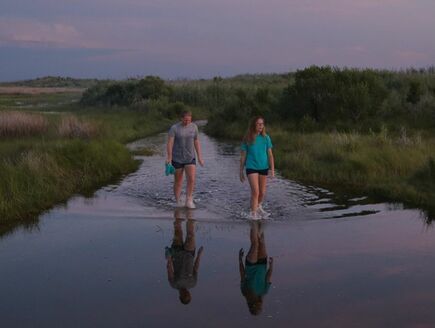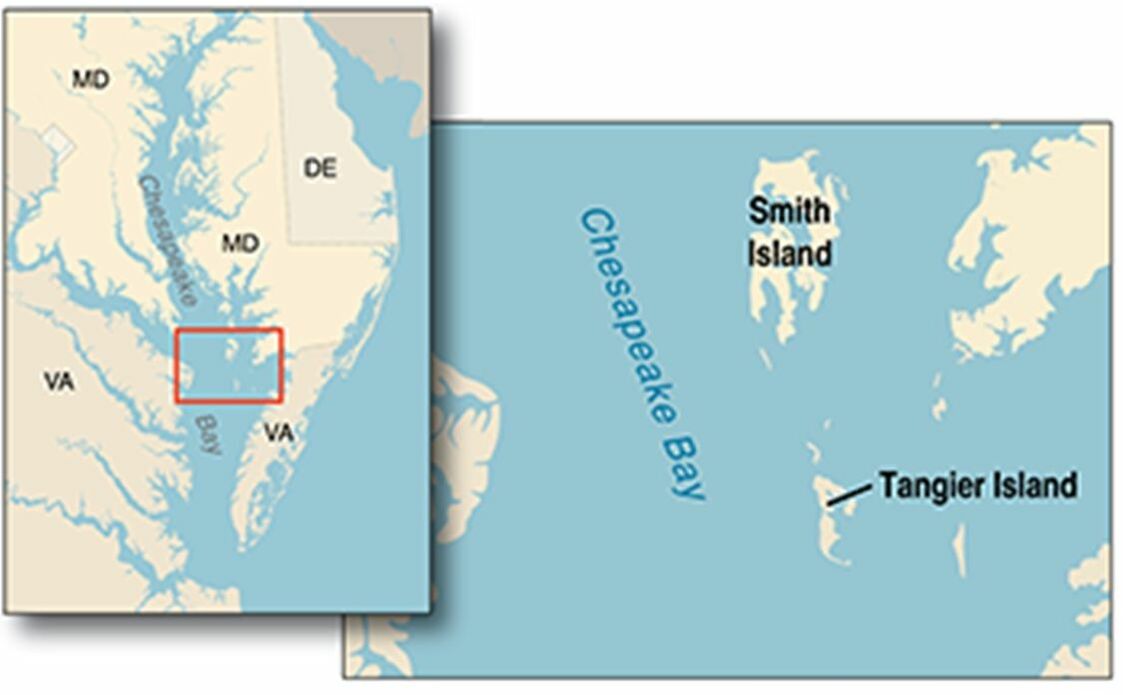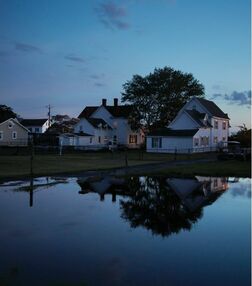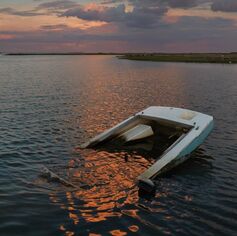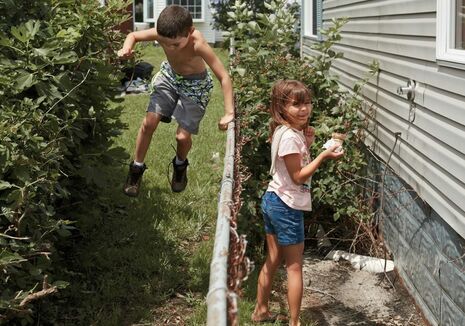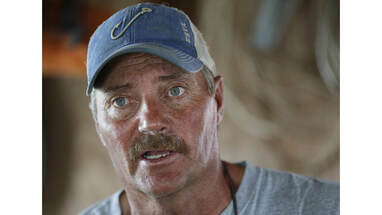This is Tangier Island Mayor James "Ooker" Eskridge's favorite time, right after 4:30 a.m., when the motor's gentle hum eases the world awake. You can lose yourself or find yourself, he says, "whatever is required," in the empty hour that follows. And then, around 6 a.m., a pale orange line bleeds up from the east, and water and sky again become two. The 60-year-old knows every inch of Tangier, this 1.2-square-mile strip off the coasts of Maryland and Virginia, population about 450. So it’s with confidence when he crouches down to the waterline on one of the wooden pylons propping up the shanty. "It's the same as it was 30 years ago," he says. "If sea level's rising, it's not enough to where we can see it."
|
The question of sea-level rise in Tangier's waters has captured much of America's attention in the last few years. Back in 2015, the science journal Nature ran a study warning of Tangier's demise at the hands of sea-level rise due to climate change. The dire findings caught the attention of climate scientists and, of course, the island's residents themselves, most of whom were skeptical. But it wasn't until last June, when Donald Trump came calling, that Tangier's plight crept into popular consciousness. After his advisers showed him a CNN report about the disappearing island and its pro-Trump inhabitants, the president phoned Eskridge and personally urged him to drop any concerns about sea-level rise. And suddenly everyone, it seemed, had an opinion on what was happening on this previously obscure island, rendering Tangier a poster child for both sides in the national conversation on climate change.
|
The story of Tangier has largely been limited to the inevitability of an island going down—the science behind it, the politics around it. And without new infrastructure, fast, Tangier is indeed going down. What's been left out, however, is why its people are willing to go down with it—and why they've risked it all on Trump to keep them afloat.
Climate scientists believe Tangier could be uninhabitable within 25 years. David Schulte, an oceanographer for the United States Army Corps of Engineers who's published writings on the Chesapeake in journals including Science, co-authored the 2015 paper in Nature that put Tangier on the map. Based in Norfolk, Virginia, he'd been studying the island for years, alarmed by the lack of attention to the place he and his colleagues predicted could see some of the nation's first refugees of climate change.
Climate scientists believe Tangier could be uninhabitable within 25 years. David Schulte, an oceanographer for the United States Army Corps of Engineers who's published writings on the Chesapeake in journals including Science, co-authored the 2015 paper in Nature that put Tangier on the map. Based in Norfolk, Virginia, he'd been studying the island for years, alarmed by the lack of attention to the place he and his colleagues predicted could see some of the nation's first refugees of climate change.
|
Thermal expansion is partly to blame for Tangier's plight: As Earth warms, oceans expand, and sea levels rise. And since the 1990s, ice sheets in Greenland and Antarctica have thawed at accelerated rates, likely in part as a result of man-made global warming, dumping more and more water into the oceans. Tangier is also coping with events dating back to the Ice Age, when a gargantuan ice sheet that stretched into the Chesapeake pressed down on the earth. It's long since melted, of course. But Tangier, which was lifted up when that ice sheet was pressing down to the north, is now sinking as the land to the north continues to rebound—kind of like a seesaw. "That just adds on to the sea-level rise and makes the problem worse here," Schulte says—approximately 40 percent worse.
|
The Army Corps estimates that Tangier's waters are rising at a rate of nearly five millimeters a year, and accelerating. It's an astonishing number, Schulte says—the global rate of sea-level rise is about three millimeters a year—but as with most things incremental, "not something you're going to notice from day to day, driving your boat around in the bay." In his paper, Schulte concludes that the island has lost around two-thirds of its landmass since 1850. At that time, it had seven areas of high ground; most have since become marshland, and, today, there are only three. The island's location — smack in the middle of the Chesapeake—coupled with a foundation largely composed of silt and sand, has made it a punching bag for waves. Locals don't dispute this: They've grown up watching waves strip away their shoreline. They know that Tangier is washing away. But many of them argue that coastal erosion is nothing new, a natural cycle that, with enough money for a seawall—a large rock barrier around the whole island—they can ultimately blunt. Yet sea-level rise and erosion aren't separable, Schulte says. As sea-level rise has quickened in the last three decades, erosion has gotten worse. "Let's say you have a storm that's coming in from the west," Schulte explains. "Now, the wave energy is going to hit the west shore of Tangier, and although the town is protected, the northern part is not. As the sea level rises, those waves are going to be able to hit higher up on the island itself." So instead of waves hitting, say, a sand beach, they'll start to hit the island's peat marsh—a far more vulnerable turf. "Once the wave energy gets high enough to start striking that layer," he says, "it just starts tearing the island apart." Schulte and Eskridge agree on one thing: Tangier needs a seawall, and it needs it now. That Eskridge believes a seawall is all they need, the ultimate solution to the island's woes, however, is where they differ. In Schulte's view, a seawall is the equivalent of a (very expensive) Band-Aid, buying the island another decade or so to get going on the kind of (much more expensive) construction project that could preserve it long-term. "If I had my way, it would already be in the [congressional] budget to do a large-scale study to basically engineer a solution to the island," Schulte says, a fix that would likely involve elevating the town by several meters.
|
As other climate scientists began to take note of Schulte's findings, and Tangier residents began to push back, CNN caught wind of the debate. Last June, a reporter and small crew showed up to spotlight the sinking island. At first, Schulte was thrilled — Tangier, he felt, was finally drawing the international attention it deserved. Yet he also says that, rather than sharpening the conversation, or bringing the island closer to the infrastructure it needs, it helped make Tangier "a political football." In the CNN piece, Eskridge said he loved Trump "as much as any family member I got." Which meant that a firestorm was ignited not necessarily over how to help Tangier, but over whether a hotbed of Trump supporters who refused to recognize the problem even deserved salvation. "What amazes me is how political and polarizing this issue became," Schulte says.
|
And then Trump called.
Less than a week after the CNN report aired, Eskridge was crabbing when one of his sons flagged him down. His son told him the president would soon be calling. Eskridge raced back home and waited by the phone. Trump finally rang. "We chatted for about 12 minutes," Eskridge recalls. "We talked about sea-level rise, and of course we're on the same page. He said Tangier has been here for hundreds of years, and it would be here for hundreds more." "Now, he knows about the erosion problem," he continues. "As for climate change, he said, 'It's just cycles and whatever changing. I don't believe that it's man causing it.'"
Less than a week after the CNN report aired, Eskridge was crabbing when one of his sons flagged him down. His son told him the president would soon be calling. Eskridge raced back home and waited by the phone. Trump finally rang. "We chatted for about 12 minutes," Eskridge recalls. "We talked about sea-level rise, and of course we're on the same page. He said Tangier has been here for hundreds of years, and it would be here for hundreds more." "Now, he knows about the erosion problem," he continues. "As for climate change, he said, 'It's just cycles and whatever changing. I don't believe that it's man causing it.'"
Outside of Tangier's own citizens, very few people seemed to be championing Eskridge's diagnosis of the island. But Trump's endorsement made for a potent salve. Since the CNN report, Eskridge had been receiving hate mail, but the hastily scrawled missives—"Dumb cracker," wrote one stranger; "You deserve to sink," said another—no longer seemed to sting. For Eskridge, loyalty on this island lies squarely with Jesus, but Trump is not far behind. He was deeply invested in the 2016 election and felt like he had a stake in things. Sure, he was a lifelong Republican, like most folks on Tangier. But Trump stirred something visceral in him, Eskridge says, reviving a hope that, on issues he cares about most—abortion, religious liberty, crabbing regulations—not all was lost. Trump affirmed what Eskridge and others had been seeing with their own eyes: The country was changing. But, more importantly, they didn't have to accept this change as gospel. Democrats tend to talk about change in unilaterally positive terms and insist that progressivism is always progress. Yet large-scale cultural shifts can be disorienting from the vantage point of an island where residents have succeeded in resisting change for a very long time. In the past, they may have just bemoaned those shifts from afar because their isolation kept them immune from the impact. But the last three years — what with scientists warning that Tangier is sinking—have caused many to worry, if only privately, that they won't be able to retreat for much longer.
Up until 20 years ago, "we didn't go off the island," says George "Cook" Cannon. "Maybe go to Sam's, or the Walmart, or the Lowe's. Red Lobster. Because the thing is, the more you communicate with the outside world, the more that it's gonna rub off on you." Trump endeared himself to Tangier not just because he affirmed what they were seeing, but also because he believed in what they weren't seeing. Most Tangier residents insist that sea levels aren't rising because, quite simply, they don't see it happening. "It's not a political issue to me. I'm not lyin' about it," Eskridge says. "I'm just tellin' folks what I see. ... I'm not a scientist, but I'm a keen observer, and I don't see it." How empowering it is, then, when the leader of the free world tells you that he agrees, and pledges that your home will be safe for hundreds of years yet. So say Eskridge and his closest friends, gathered one afternoon in what they call the Situation Room. They congregate almost every day in this small, teal-tiled space that used to be part of the old health center. In fact, some of the men were born in this room. They now use it to gossip and talk politics. "I wish we could get him to come here," Jerry Pruitt, who is in his seventies, says of Trump. A few minutes later, he turns in his chair toward Eskridge. "You should call him and say you'd like to have a meeting with him — you might get him." "Yeah, you know, Donald Trump could put the wall around here," Eskridge says, his arms outstretched. The six men chuckle. "I'll say, 'Hey, we'll take the wall, and we'll even name it after him.' The Donald Trump Seawall." Pruitt nods. "I believe he'd do great if they'd...." The room finishes his sentence in chorus: "Work with him." Pruitt continues: "Ain't got nothing to work with, not on either side." Still, they're confident Trump can cut through the congressional morass and get them a seawall. "We're on the same page," Eskridge says. He's the first president in a long time, it seems, "who knows what we need."
|
Their conversation offers a glimpse into the unshakable loyalty of Trump's base. To feel seen is powerful, especially when the last Republican president turned out to be a country-club conservative like all the others. To feel seen is enough to make the islanders of Tangier trust that what Trump promises is, in fact, coming. But it's tough to overstate the stakes: For them, the difference between Trump being right and Trump being wrong is not bragging rights, or more-favorable mid-term elections, or fewer brown people in America. It is the difference between their home—and way of life—being above water or below it.
|
So what if he is wrong, as all available science shows he is? What if the problem is, in fact, bigger than a seawall can solve? Says Eskridge: "We ain't thought that far ahead."
Last August, Bob Inglis and a camera crew trooped to Tangier for a two-day visit. Seven years ago, the former Republican congressman from South Carolina founded what would become republicEn, a grassroots effort that promotes "free enterprise" solutions to climate change. Inglis had teamed up with Starbucks to shoot a short film on how sea-level rise was imperiling the island. They had all but written the script before they arrived. Inglis expected to play the role of "climate warrior" doing "battle" with "troglodytes on a sinking island," he says. He expected a crush of emblematic Trump voters, angry white men ready for combat. He didn't expect to convince them of the realities of sea-level rise—and that was just fine, as far as making a good video went. The ostensible purpose, though, was to evangelize on the "need for action" on climate change, nebulous as that may be.
"It turned out to be a different story," Inglis says.
Last August, Bob Inglis and a camera crew trooped to Tangier for a two-day visit. Seven years ago, the former Republican congressman from South Carolina founded what would become republicEn, a grassroots effort that promotes "free enterprise" solutions to climate change. Inglis had teamed up with Starbucks to shoot a short film on how sea-level rise was imperiling the island. They had all but written the script before they arrived. Inglis expected to play the role of "climate warrior" doing "battle" with "troglodytes on a sinking island," he says. He expected a crush of emblematic Trump voters, angry white men ready for combat. He didn't expect to convince them of the realities of sea-level rise—and that was just fine, as far as making a good video went. The ostensible purpose, though, was to evangelize on the "need for action" on climate change, nebulous as that may be.
"It turned out to be a different story," Inglis says.
|
Eskridge ferried him around the island. He told Inglis about how his wife had always wanted a girl, how they'd had trouble conceiving again after having two boys. They ultimately would adopt four daughters from India, women who are now in their twenties and living in different cities across the country. That's why his boat is called Sreedevi, he told Inglis, the name of their first daughter. He showed him the osprey nesting platforms he'd built. "I grew up on the coast, but I'd never been that close to an osprey nest," Inglis reflects. He was enthralled by Eskridge's familiarity, gentleness with the animals, how he'd named several different seagulls and knew them by sight. "In other words, this guy is wonderful," he says. Listening to Inglis recount these moments is a lot like listening to a breathless college kid fresh off a summer abroad. It's been a common theme in the last couple of years: quixotic dispatches from "Trump's America" meant to unveil those who sent a reality-television star to the White House. Inglis is aware he sounds clichéd: "You taught me not to judge a book by its cover — a lesson that I've learned over and over but that I seem to forget as often as I learn it," he would later write in a letter to Eskridge.
|
When the water is low, cousins Wesley-Dean Tyler and Jordan Daley can pick raspberries behind their grandmother's house on Tangier Island.
|
Inglis was correct, though, in predicting he wouldn't change hearts and minds. He saw their contradictions up close, he says. "One of the first things I noticed is that people park their golf carts up on little docks in their front yard—wooden platforms that are maybe a foot, 18 inches off the ground." This is to keep the water from ruining their electrical systems. "Then we went by the schoolhouse, and I saw the schoolhouse had been raised about six or eight feet, because at high tide, there's water underneath it." Inglis understands that Tangier residents premise their argument against sea-level rise in observation. Which made it hard for him to understand how visuals such as the golf cart platforms and the elevated schoolhouse didn't at least cause them to pause and reconsider. Because those scenes show standing water, immovable water, water pushing up above the ground—something erosion alone can't explain. I ask Eskridge how he squares this. "It's not any worse than it's always been," he says.
By the end of his trip, Inglis found himself in some ways sympathetic. "I think what I learned is that, if I were in that situation, maybe I, too, would want it to be something other than sea-level rise," he says. "It's just hard to cope with the thought that your whole way of life is going to go away."
In the U.S., those who advocate for policies intended to curb the rate of global warming almost always speak in terms of the future. Which makes sense: As of now, there are very few Americans who have seen their daily lives dramatically altered by climate change. When policy debates are centered on predicted damage, though, and not the here and now, it is harder to spark passion and urgency among voters. For Inglis, Tangier is the canary in the coal mine for the devastating effects of sea-level rise along America's coasts. But, he says, it is also the first test of how effective we are in shifting our vernacular—from the cerebral language of scientific models and calculations to the language of the present, of lives and families and homes.
In the U.S., those who advocate for policies intended to curb the rate of global warming almost always speak in terms of the future. Which makes sense: As of now, there are very few Americans who have seen their daily lives dramatically altered by climate change. When policy debates are centered on predicted damage, though, and not the here and now, it is harder to spark passion and urgency among voters. For Inglis, Tangier is the canary in the coal mine for the devastating effects of sea-level rise along America's coasts. But, he says, it is also the first test of how effective we are in shifting our vernacular—from the cerebral language of scientific models and calculations to the language of the present, of lives and families and homes.
|
So far, it's not going well. In the summer of 2017, CNN brought Eskridge and his wife up to New York to participate in a climate change town hall with Al Gore, whom many Americans regard as the face of the issue. Eskridge asked Gore why he wasn't seeing physical evidence of sea-level rise. Gore cited the science. Then he told a joke about a man who was trapped at his home during a flood. The man refused three modes of rescue, saying the Lord would provide. After the man died and reached heaven, he told God he thought he was going to save him. "And [God] said: 'What do you mean? I sent you an SUV, a boat, and a helicopter,'" Gore finished.
|
For Eskridge, of all the moments in the debate, this one stands out the most. In his view, it was a reminder that Gore and his cohort look down on people like him and their beliefs. "I didn't like the joke," he says. "I thought it was in bad taste."
Reprinted with permission Pacific Standard, Copyright © 2018
Reprinted with permission Pacific Standard, Copyright © 2018


